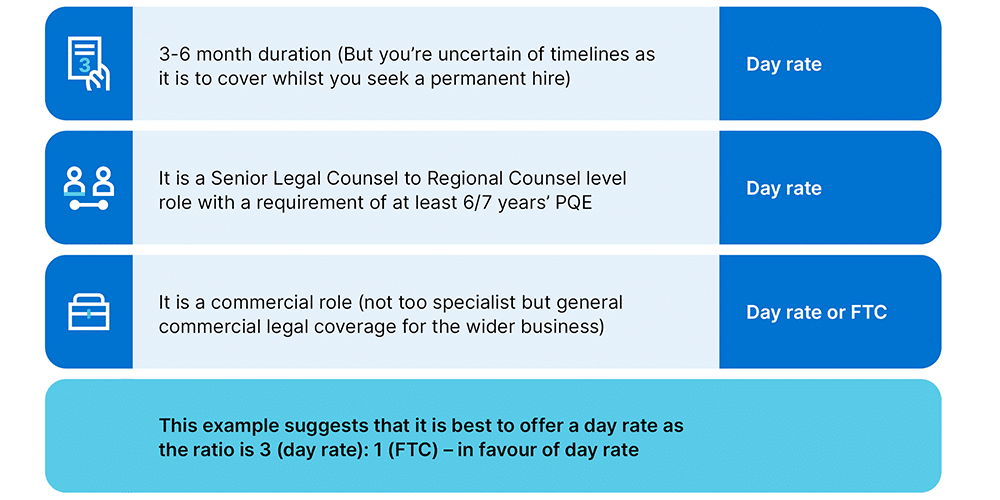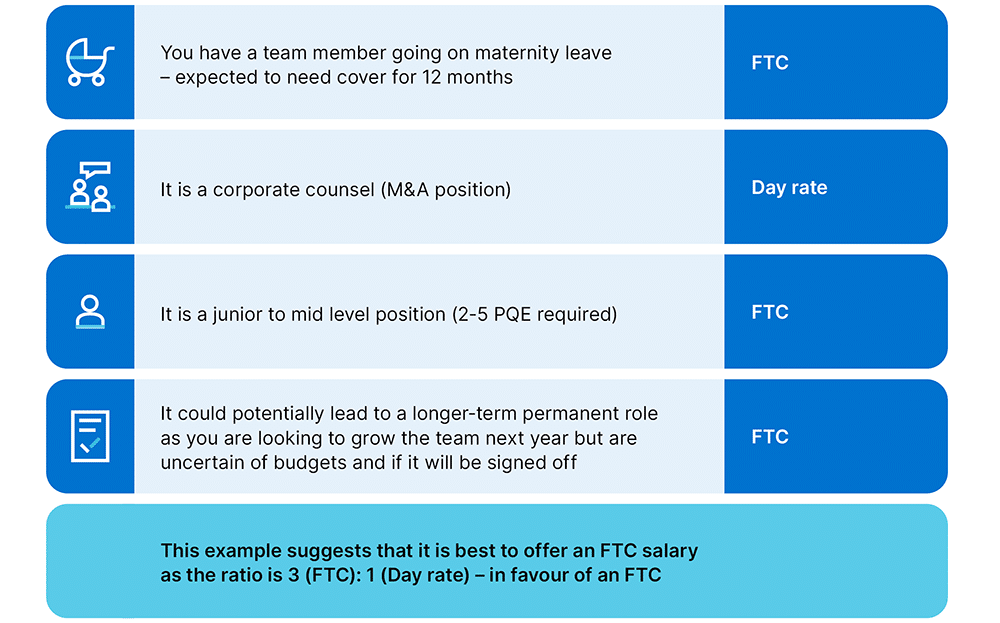How to engage interim legal resource: Day rate vs fixed term contract
What is the difference between day rate contractors and salaried fixed term contract (FTC) employees?
What type of contract to choose has been an age long debate in the interim market and it can be confusing to know which route is best for your legal function. Taylor Root has been working closely with businesses for decades to find interim solutions and has the market knowledge and track record to advise on whether fixed-term employees or those on a daily rate will give you access to the best talent and ensure a successful interim hiring process.
The truth is, there are pros and cons to day rate hires and fixed-term contracts if you are looking for short-term resource. Both are highly suitable offerings when thinking about interim legal hiring and can often be a more valuable and cost-effective solution when compared to outsourcing legal work or implementing secondees.
What factors affect the decision to appoint via day rate or fixed term contract?
There are several factors to assess when considering which route to take when hiring interim legal professionals and what will give your organisation the most success in bringing in the right talent.
We call these factors; The 7 wonders of the interim world:
- The type of role/technical knowledge you require
- The level/seniority of role
- The duration of the contract
- The purpose or reason for the interim requirement
- The budgets and the “pot” the interim hire needs to come from
- The ability to have additional “headcount” and the organisation’s situation/status
- The comparison of cost to other outsourced/ flexible legal resources on offer
Which route might be best for my interim legal requirements?
When you look at the below table, tally up the various elements of your role to understand which route might be best.
| Role elements | Recommendation and candidate preferences | |
|---|---|---|
| Day rate | Fixed-term contract employee | |
| Contract duration: | ||
| Short-term contract (6 months OR less) | ✔ | |
| Medium-term to long term contract | ✔ | ✔ |
| Technical experience needed: | ||
| Corporate M&A, technology or telecoms, regulatory | ✔ | |
| Commercial, employment, property, company secretarial, data privacy | ✔ | ✔ |
| Special project: | ||
| Examples – Legal audit preparation, legal operations and strategy, acquisition integration, technology implementation, compliance projects, procurement projects, corporate – JV/M&A projects | ✔ | |
| Financial services examples: regulatory change projects, repapering exercises, applying for/securing a FCA license for business, start-up/scale-up hiring | ✔ | |
| Level of the role: | ||
| Senior Counsel to Legal Director | ✔ | ✔ |
| Junior to mid-level counsel (1-5PQE) | ✔ | |
| Purpose of the role: | ||
| Maternity leave | ✔ | |
| Sickness leave (uncertain timelines) | ✔ | |
| Sabbatical leave | ✔ | |
| Gap management – waiting for a permanent employee to start (uncertain timelines, typically 3-6 month requirements) | ✔ | |
| Work overflow (uncertain timelines/short term) | ✔ | |
| Work overflow (uncertain timelines/medium term) | ✔ | |
| Business circumstances: | ||
| No head count sign off for a permanent role but the business needs additional, full time, in-house legal support | ✔ | |
| Very tight budgets | ✔ | |
| Business going through: restructuring/mergers/acquisitions | ✔ | |
| Businesses looking to hire first legal head | ✔ | ✔ |
| Businesses looking to hire on a permanent contract but wish to offer on an interim basis for a period of time to ensure the right hire is made | ✔ | |
| Businesses looking to reduce outsourcing spend in the short to medium term | ✔ | ✔ |
We have put together some examples of interim requirements and worked these through using the table above to give you an idea of what the recommended route might be.
Example 1
You have an interim requirement with the below elements:

Example 2
You have an interim requirement with the below elements:

Key takeaways
- Understanding the interim market and what interim and temporary workers think about when considering new interim roles is really important in order to attracting the best talent for short to medium term positions
- Using this resource as well as our Global in-house legal market report and salary guide 2023-2024 can help immensely to provide clarity to senior stakeholders when you are thinking about building a business case and successfully gaining sign off from CFO/ CEO’s for interim legal requirements
- Daily rate hires are more appropriate if businesses need greater flexibility when hiring interim resources, have uncertain circumstances/ timelines or when they are seeking candidates who have specialist legal knowledge or sector experience
- Fixed term employee hires are more appropriate when businesses need stability without having permanent head-count sign off, have longer term employment contracts, have certainty in the duration of contracts or are wanting to hire junior to mid-level candidates
- Pitching an interim role clearly and correctly from the start will ensure rapid results and a smooth process start to finish. This includes:
- 1. Knowing what basis you wish to hire someone (FTC or Day Rate)
- 2. If a day rate is the preferred route, is the role “inside IR35” or “Outside IR35”? Do you understand the employment laws around this? You can complete a quick assessment on the HMRC website to assess this. Doing this at the start is always recommended. Check employment status for tax – GOV.UK (www.gov.uk) As an agency, we will ensure that the contractor is appropriately set up and compliant with the outcome of the IR35 determination
- 3. Ensuring day rates and salaries are in-line with market rates and reflective of the seniority of the position and expectations of the role
- 4. Providing clarity over the remit of the role, the reason for the hire and approximate durations and start dates
For more information or support with hiring interim in-house legal professionals, get in touch with our dedicated interim resourcing team in London or in your local region.
